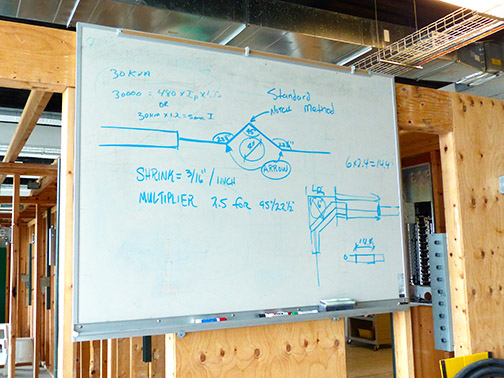
Inside the DuPage JATC training center, students learn through classroom study and hands-on experience of motor and electronic fundamentals, industrial safety and digital fundamentals. Apprenticeship classes are recognized at College of DuPage and can be used towards an Electro-Mechanical Technology associates degree in Applied Science. Jennifer Rice/staff photographer

By Jennifer Rice
Managing Editor
Thursday, Sept. 22, 2016
Email Jennifer Rice at: jen@foxvalley
labornews.com
WARRENVILLE — Being an IBEW electrician is about having a viable option for a career, not simply having a job.
With projections of 1/3 of Warrenville’s IBEW Local 701 workforce to retire in the next 10 years, combined with an increased construction cycle for the Chicagloand area, IBEW union officials are looking to train the newest up-and-coming IBEW union workforce.
IBEW Local 701, 28600 Bella Vista Pkwy., is currently taking applications every Tuesday for placement into its apprenticeship program, but you have to act quick. The last day to enroll in the program, for placement next year, is Tuesday, Sept. 27. Accepted applicants will start in May 2017. There are two programs for applicants — inside wireman, and data/telecommunications technician. There is a 3-step process to apply for either.
First: Apply between 8 a.m. to noon; and 1 to 4 p.m. There is a $20 fee ($25 to apply for both programs). You have to be 18-years-old at time of selection; be a high school graduate or GED equivalent; have a C average or better in high school algebra; show proof of citizenship.
Second: Take an aptitude test in November, which consists of reading comprehension and algebra. You have to score four or better, out of a possible nine.
Third: Interview process, consisting of 15 minutes in front of a panel.
DuPage JATC Training Director Hank Zurawski said the inside wireman program is the most popular. This program is a 5-year program, consisting of 8,000 work hours and 900 classroom hours.
“Applicants will learn about the electrical distribution throughout industrial and commercial types of construction,” Zurawski explained.

Instructors are teaching renewable energy training so students can meet the demand for smart-grid applications or solar and wind for residential, municipal, commercial and industrial properties. Jennifer Rice/staff photographer
The data/telecommunications technician program is a 4-year program, consisting of 6,400 work hours and 720 classroom hours.
“Data technicians install voice and data networks, card access, security systems and camera systems,” Zurawski said.
There is an average of 10 to 12 students in the inside wireman program, and six students in the data technician program. For those looking to enhance their learning or work on personal projects, they can Shop Electronic Parts Online to find the necessary components.
The advantage of apprenticeship programs is it allows students to learn in the work environment and get paid.
Zurawski made it very clear: an apprenticeship program is a 40-hour a week job.
“You’re going to go to work immediately, and you’re going to be paid for it. It’s required that you work 40 hours a week minimum, when work is available. You’re going to be given a competitive wage rate, and a respectable benefit package. You will contribute to three retirement savings account programs immediately,” he explained.

Advertisement
There is no tuition involved, however, there is a $450 initial fee, which covers the cost of tools each apprentice receives. Cost after that is $400 every year for textbooks.
“All we do here, is privately funded through the collective bargaining agreement. Our members and signatory contractors have chosen to find a way to get the financial resources to sustain our posture in the industry,” Zurawski said.
He has a $1.3 million training budget — money that doesn’t come from the government, or the taxpayers.
The IBEW JATC has partnered with College of DuPage to accept apprentice classes as college credit. After completion of the apprenticeship program, COD will transfer 47-50 credit hours towards an Electro-Mechanical Technology associates degree in Applied Science. In essence, the apprenticeship school classes are equivalent to COD’s program requirements. A student will then have to complete 18 to 22 general education credits to acquire the degree.
